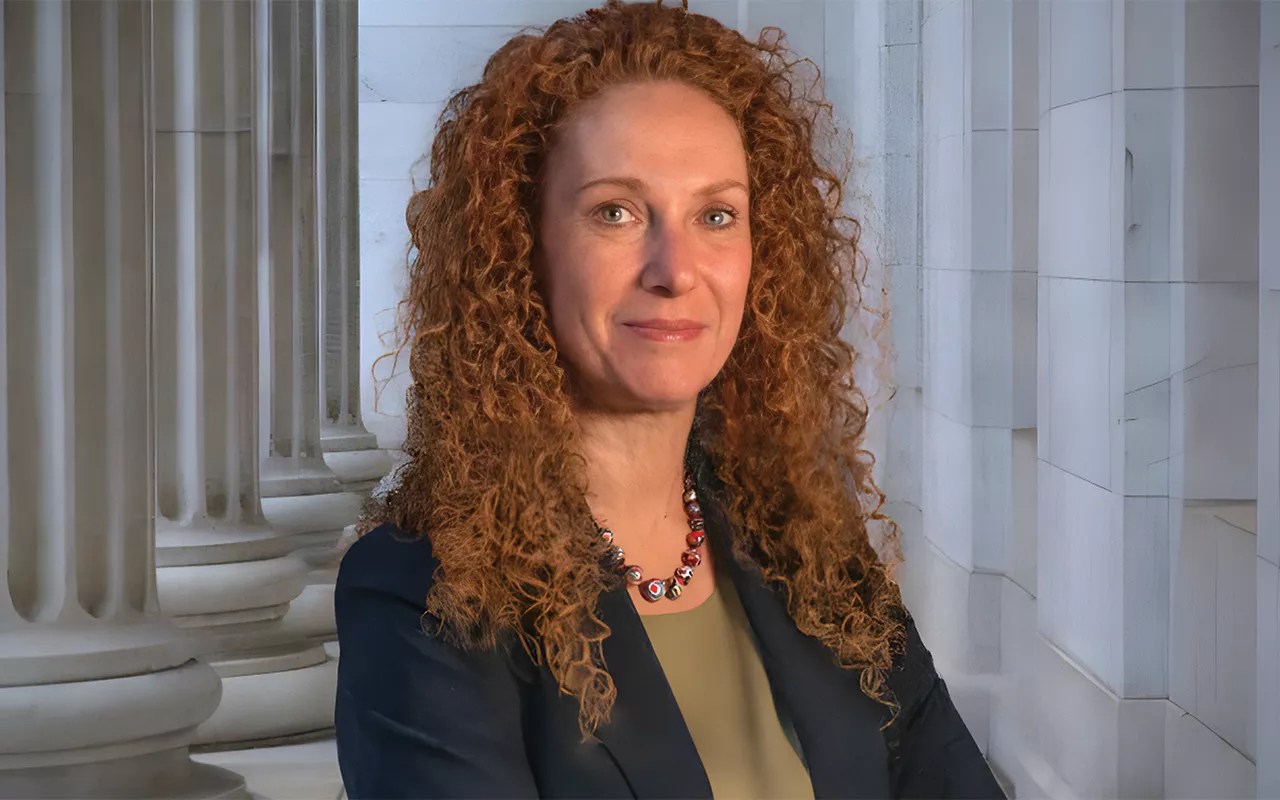
Evan Semón

Audio By Carbonatix
Mari Newman is an activist, mother and warrior. You need to be when you’re a gay, Jewish, left-wing attorney going into Cuba’s Guantanamo prison in the mid-2000s to defend Muslim men accused of taking part in 9/11. For half a decade, they’d been held by the U.S. government without legal rights or judicial review. A small group of American attorneys, including Newman, volunteered to go to Gitmo at their law firms’ expense and represent the men pro bono.
“You do some cases pro bono because it’s the right thing to do,” says Newman. “This was one of them.”
At the time, the American guards at Gitmo were telling inmates that all the attorneys trying to assist them were either gay or Jewish, or gay and Jewish, and could never be trusted: They were spies for the FBI or CIA. But everything Newman saw, heard or experienced on her fifteen or so visits to Guantanamo only made her more determined to fulfill her commitment to the Geneva Conventions, the U.S. Constitution and the rule of law.
“Gitmo was eye-opening, to say the least,” she recalls. “What was happening to our clients challenged our ability to feel good about our country.”
What was happening involved carrying out the systematic torture of prisoners, sexual and otherwise, in ways she won’t talk about more than fifteen years later. She did all she could to help the incarcerated men – from formal legal work to bringing in Middle Eastern food and other client favorites, like baba ganoush, Flamin’ Hot Cheetos and frozen cream puffs. After many years of hard work by Newman and other pro bono counsel, four of her clients are out of Gitmo and the fifth’s release is pending. All the while, Newman continued to take on some of the highest-profile and most controversial cases in Denver and Colorado – despite the childhood admonishments of her grandmother.
A Family Tradition
Gertrude Hausmann grew up in Vienna in the 1920s. In 1934, she left Austria for America to continue her study of ophthalmology, but soon returned home. In 1936, with the Nazis closing in, she was warned by a hospital worker who was a member of the Nazi Party to “get out and don’t take anything with you!” She fled to the States, eventually settling in Denver’s Hilltop neighborhood.
When she launched her practice as the first female ophthalmologist in Denver, she had very few patients; she asked her husband to sit in the office lobby so it looked as if she were busy. In the absence of facilities for women, she dressed for surgery in a broom closet. “There was nothing my grandma could not overcome,” says Newman. “She was less than five feet tall, but I’ve yet to meet anyone more powerful.”
Born in 1969, Mari Newman grew up sitting on her grandmother’s couch, listening to the woman talk about the horrors of WWII – which left a lasting impression. She attended Colorado Academy, a private day school, but never wanted this association with an upper-class institution to define her; her privileged background commingled, often uneasily, with her working-class commitments. Her grandmother told her to be cautious in her associations and not call attention to her progressive political beliefs: If she became too visible, there might be consequences. She listened carefully to the woman’s words, but they didn’t take. By the early 1980s, the teenager was publicly protesting environmental issues and U.S. foreign policy in Latin America.
As an undergrad, Newman studied politics and environmental science at the University of California, Santa Cruz. Following college, she went to Africa and taught permaculture, trekking across the continent with a friend until she came to a resolution: Go home and do what she really wanted to.
“I wanted to create change,” she says, “and I felt I could do it more effectively in the United States. I didn’t want to be that American woman going around another country telling people what to do, without the cultural literacy to understand the bigger picture. The law felt like the right tool to accomplish my goals here at home.”
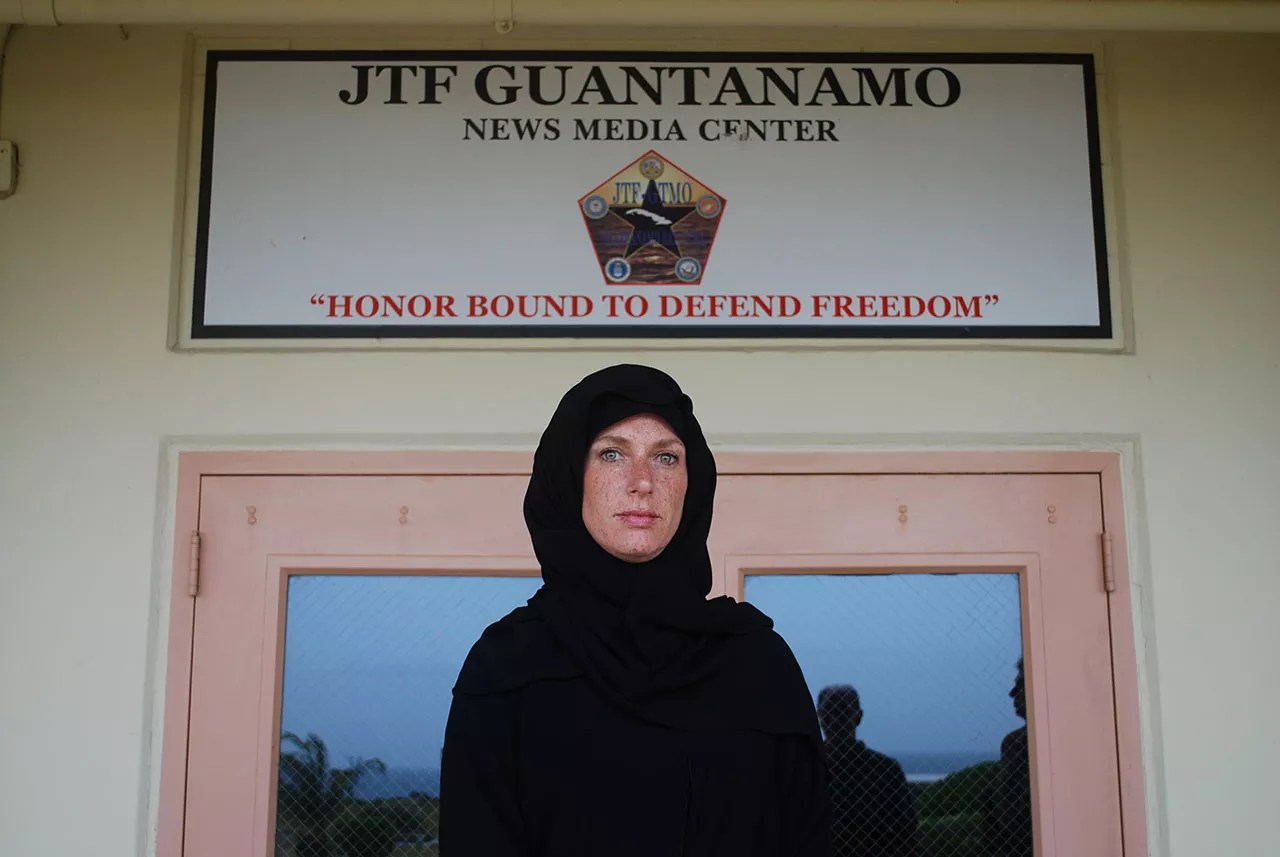
Mari Newman’s pro bono work at Guantanamo Bay helped free prisoners…but she paid a price.
Courtesy of Mari Newman
From Africa, Newman hand-wrote her application to the public interest law school at Northeastern University in Boston. Her first year there was so challenging that her job washing dishes at a local restaurant was a welcome respite from the pressures of law school. She also worked for the NAACP Legal Defense and Education Fund in New York on anti-discrimination cases and wanted to continue this after graduation, but was told that the NAACP hired only those from Ivy League schools.
Returning to Denver, Newman landed a year-long judicial clerkship in Denver District Court. For a while, things went well and she was a rising star. Then her co-workers found out she was dating women, which unleashed a barrage of gossip and backbiting. Newman was stunned and hurt, not expecting a nasty reaction from those who admired her work. Until now, she’d only known what it was like to work on anti-discrimination cases. Suddenly, she was directly feeling discrimination.
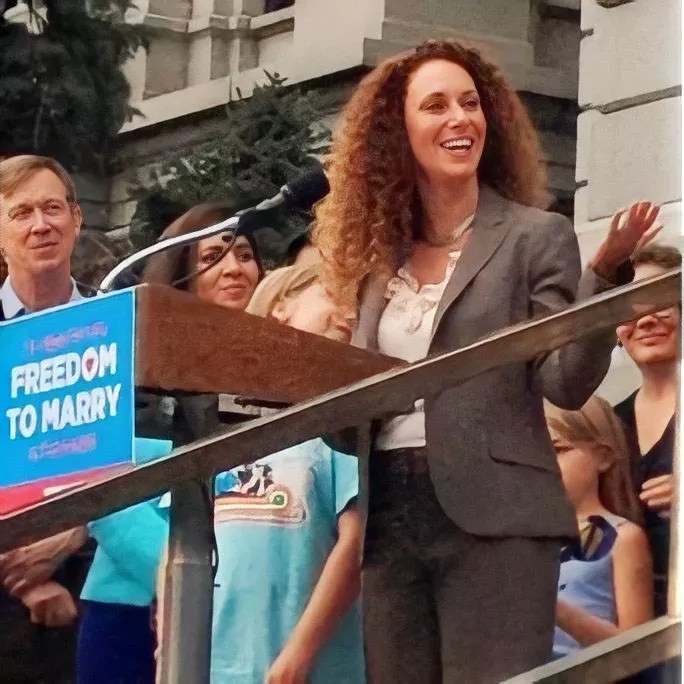
Mari Newman joined John Hickenlooper at a rally for gay marriage.
Courtesy of Mari Newman
“Everything changed at the office,” she says. “From their perspective, I couldn’t do anything right. I couldn’t even make the coffee right. It was my time to learn that justice isn’t blind. It’s meted out by regular humans in positions of authority. Seeing and feeling that on a personal level demystified the robe.
“I thought my legal career was over before it had even started,” adds Newman. “My vision for a future as a civil rights lawyer fighting for change was ruined.” Depressed, she got a pep talk from Mary McClatchey, an attorney who’d attended the same law school: Her life wasn’t over, her career wasn’t finished; all this would pass and she’d go on to do good work in anti-discrimination law. She needed to ignore the painful things others were saying around her, be herself at work and at home, push forward, and do what she’d been trained to do.
Decades later, Newman would give the same talk to a tormented young woman who’d recently failed to pass the Colorado bar.
Through her clerkship, Newman heard about a lawyer, Darold Killmer, with the well-known firm of Miller, Lane, Killmer & Greisen; she watched him work in the courtroom, impressed by the way he handled himself under pressure, by his presentation to the judge and his overall demeanor. “I saw a lot of terrible lawyers during my time as a law clerk,” she says, “but Darold was of a very different caliber.” They met, and she expressed interest in a job at his firm, but he didn’t have anything at the time. She began looking for something in California, where she’d already passed the bar, and as she was packing to head west, Killmer called to offer her a position.
Newman unpacked and settled in at the firm, but not before making an unusual request: She asked him for a three-month tryout before fully committing to the job.
After three months, she decided to stay; the rebellious nature of the office was a perfect fit. Newman and Killmer went on to win multiple cases together as the firm morphed into Killmer, Lane & Newman. Its reputation and notoriety grew when it took on the case of Ward Churchill following his firing from the University of Colorado for making controversial statements about 9/11, along with plagiarism charges that the firm argued were retaliation for his speech.
Heading to Guantanamo
Then the office learned that the Middle Eastern men being held as prisoners in Guantanamo Bay were seeking legal help. There were countless obstacles to the work. In addition to the U.S. government’s efforts to undercut the trust between the prisoners and the lawyers who were volunteering to represent them, the feds were justifying their continued detention by claiming that their home countries didn’t want the men back. Newman and the other pro bono lawyers knew this was a lie, and lawyered their way past these roadblocks.
Newman flew to Yemen, her clients’ homeland, to get to know their relatives; the meetings were heart-wrenching. The sister of one client was so grateful for her work that she gave Newman a dress from her closet as a thank-you gift. Younger siblings and cousins sat on her lap and laughed at her efforts to speak to them in Arabic. By now, Newman had a child of her own; while she worked in Yemen, her partner finished potty-training their daughter.
Newman and other volunteer lawyers met with high-ranking Yemeni officials to get formal declarations that Yemen did, in fact, want the detainees back. “The trip was like nothing I’d ever experienced,” she recalls. “It seemed as though we were followed everywhere we went; what I couldn’t tell was which of the men following us were U.S. agents and which were members of the Yemeni secret police. My grandmother was an adventurous traveler, but this was one trip she definitely would not have approved of.”
Newman and the other lawyers flew on to Guantanamo in a small plane so rickety that it seemed to be “held together with bubble gum,” she remembers. The guards greeted them “with horror and mockery” and full-body searches. Clothed head to toe in a black hijab to meet with her Muslim clients, the diminutive Newman entered not just the world of men, but of unbridled brutality.
They adjusted to living in “Combined Bachelor’s Quarters” and dined at a chow hall where the guards would not address Newman directly, but instead asked her male colleague to tell her that she could not wear a sleeveless shirt in the military dining hall around American service members.
For more than a decade, Newman and her team returned to the Guantanamo Bay Naval Base over and over again to meet with their clients. They read briefs, filed motions and sifted through the limited classified documents they were allowed to read in a “secure” facility outside of Washington, D.C. And they learned of the “Black Sites” around the world where the U.S. was using more extreme forms of torture. The experience was haunting for Newman, who recalled her grandmother’s stories of the Holocaust.
Newman does not like to talk about how the work impacted her. “At Gitmo, I developed my own form of secondary trauma,” she says. “But it was nothing compared to the horrors that our clients suffered. It hardened my resolve to take a moral position against any form of fascism, whether it was discrimination by corporate employers or brutality by domestic police. Or Gitmo.”
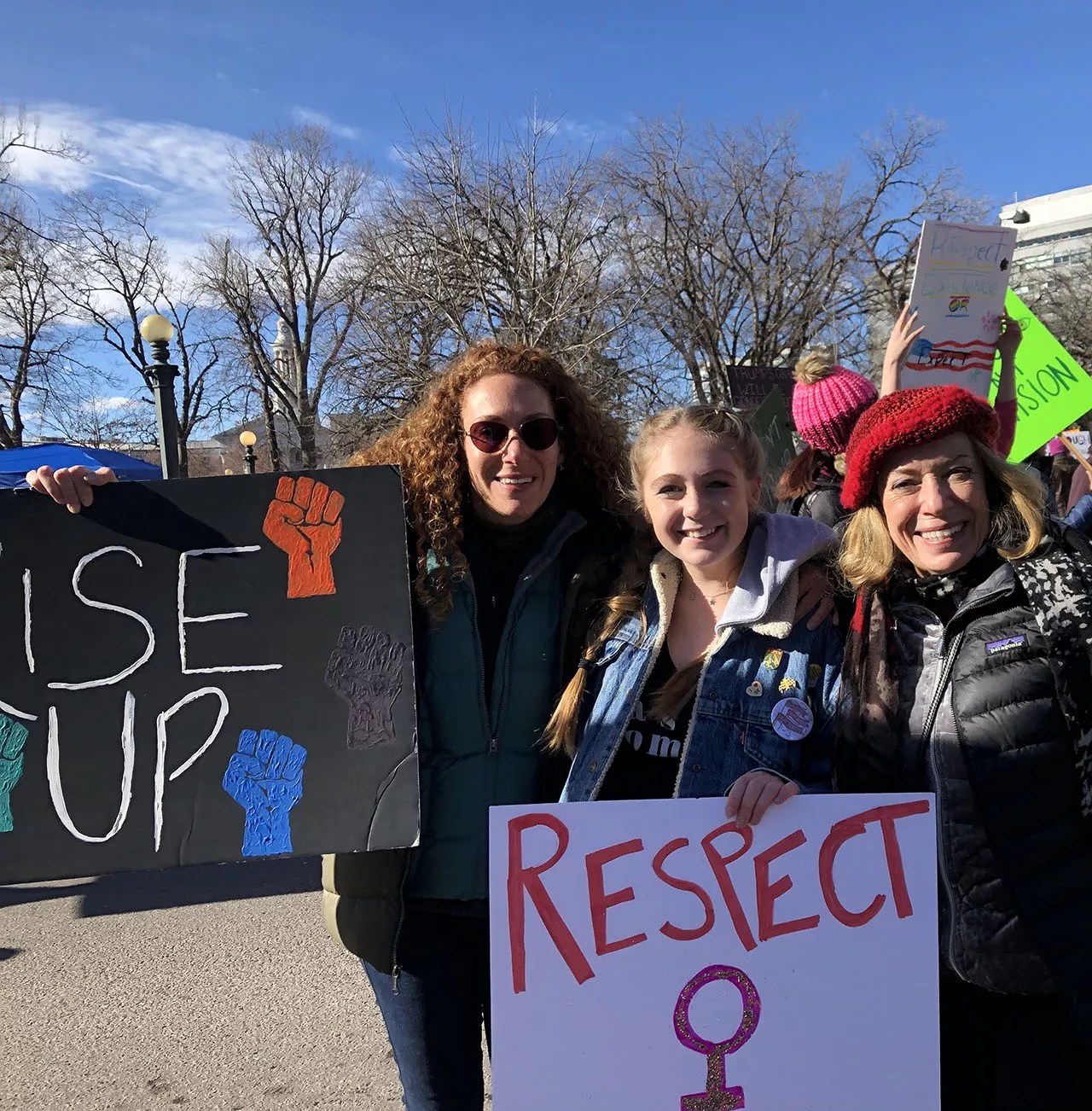
After Trump’s election, Mari Newman demonstrated with her mother and daughter.
Courtesy of Mari Newman
Throughout her time working on the Gitmo cases, Newman was also cultivating an active civil rights practice, taking on new legal challenges inside America’s borders.
One such case was that of Emily Rice, a young woman who died in the Denver jail of treatable internal injuries after being involved in a one-car accident. Emily writhed in agony while jail nurses and guards ignored her cries and told her to quit being a “drama queen.” As a young mother, Newman was profoundly impacted by the grief of Emily’s family. “Emily and her mom shared the kind of close relationship that my mom, my grandmother and I all shared, and that I was looking forward to having with my daughter when she grew up,” says Newman. “The devastation of that being taken from Emily’s mom continues to haunt me.” The case settled for a total of $7 million, with binding commitments from the city and the jail’s medical provider for better training and policy change.
The Fight for Racial Justice
In 2010, Marvin Booker, a homeless street preacher, was killed while being restrained by Denver sheriff’s deputies. Contacted by Booker’s family, Newman’s firm sued the city. They argued that the jail’s guards had used wildly excessive force to restrain Booker when he went back to get his shoes, which he had taken off and left under his chair during the many hours he waited to be booked into the jail after being arrested on a petty offense.
The team discovered that the guard who started the altercation that escalated into the violence that caused Booker’s death was one of the guards most responsible for the death of Emily Rice a few years earlier. The City of Denver insisted that all of its officers had acted appropriately and said Booker had actually caused his own death. A jury disagreed. After nearly five years of litigation and a hard-fought trial, the team won what was then the largest jury verdict in civil rights litigation in the state’s history: $4.85 million, with the case ultimately settling for $6 million after attorneys’ fees and costs.
As with many of her other cases, though, Newman was working for more than money. She and the rest of the legal team had not only proved that Booker died because of a chokehold and the use of a stun gun; they also uncovered evidence that Denver sheriffs had deleted surveillance video and even destroyed the taser that had contributed to his death.
In 2017, a grand jury was called to see whether criminal charges were in order based on the evidence uncovered at the civil trial. They were not, according to Beth McCann, Denver district attorney. “I am not able to discuss the proceedings in the grand jury. I cannot reopen the case at this point,” she said. Then-Mayor Michael Hancock agreed with this assessment.
Following the Booker trial, another unhoused Black man, Michael Marshall, was killed in a Denver jail, and Newman helped represent his family. This time, Denver did not drag the grieving family through years of litigation, but settled the case for the same $4.85 million from the City of Denver awarded by the jury verdict in the Booker case, as well as an additional sum from Denver Health.
“But Michael Marshall’s family had seen that money alone was not enough to change the way that Denver’s jail guards treated vulnerable people in custody. They wanted to reform the system,” says Newman, who negotiated with city officials to ensure full-time mental health care in jails and other reforms to prevent future deaths in facilities overseen by the Denver Sheriff Department.
After enduring anti-gay discrimination as a law clerk, Newman was more determined than ever to change the system. She served on Denver’s Commission for Gay, Lesbian, Bisexual and Transgender Rights for over a decade, working with both Mayor Wellington Webb and Mayor John Hickenlooper. In the late 1990s, she helped draft the language adding LGBTQ protections to the state’s anti-discrimination laws; she testified at the Colorado Legislature every year for seven years until it passed. In 2014, she brought the federal case resulting in marriage equality in Colorado.
Newman’s name became synonymous with defending the underrepresented, the downtrodden and the disenfranchised. Bigger anti-discrimination cases and murders by law enforcement kept coming her way.
Newman successfully advocated for Amanda Hall, who’d endured repeated sexual assaults by a prison guard. She was proud to win a seven-figure verdict for her client, but even more so for securing legally binding commitments from the state to make crucial changes in the prison’s policies and training, and ensure that cameras were installed to eliminate blind spots where guards knew they could engage in illicit activities without being caught. Incidents of sexual assaults in the Colorado Department of Corrections significantly decreased after that.
Newman also won a million-dollar settlement against state workers responsible for strip-searching residents at an assisted-living facility in Pueblo for people with profound mental disabilities. The state made numerous changes in policy and training there, which Newman believes will rein in future abuse at such facilities.
Justice for Elijah McClain
And then she took on one of the most unsettling cases of her career, after Elijah McClain died following a vicious encounter with members of the Aurora Police Department in August 2019.
In May 2020, George Floyd was choked to death by a member of law enforcement in Minneapolis – on an open street and on camera. The country erupted in protests, and Newman walked alongside protesters who were leading the way in Denver. Many people who’d ignored the Booker case for a decade now joined the fight, as George Floyd’s death brought to the surface decades-old anger and pain.
One chokehold unleashed rage.
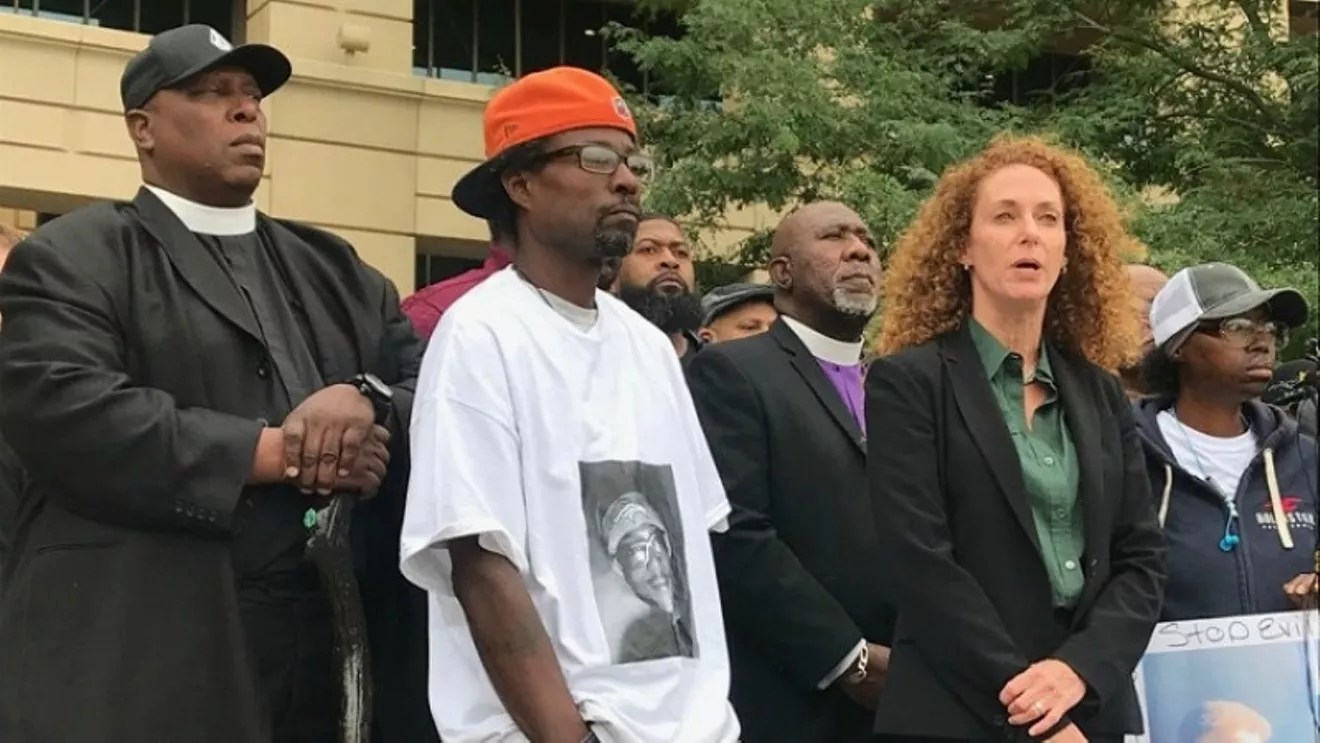
Mari Newman represented the Estate of Elijah McClain.
Michael Roberts
And after months of relative silence, Elijah McClain’s case suddenly exploded. Just before the one-year anniversary of his death, Newman filed a lawsuit on behalf of the Estate of Elijah McClain and his parents against the City of Aurora and the police officers and medics involved in his death. Newman poured her heart and soul into the case, working on it night and day as offices were closed during the COVID pandemic. Shortly before the case was set to go to mediation, things became rocky between the two parents, and Newman’s relationship with Elijah’s mother became strained. Newman remained the lawyer for the Estate of Elijah McClain and his father, while Elijah’s mother hired other attorneys. The case went to mediation and settled for $15 million. It was the largest settlement in civil rights litigation in the state’s history.
Newman is reluctant to talk about Elijah’s parents, but when she does, it reveals the personal toll that the case took on her and everyone involved. “The legal process is very hard on victims,” she says. “It’s highly invasive of their personal lives. In Elijah’s case, Aurora asked a lot of intrusive questions about his background and upbringing. You spend so much time with people and do your best to support them and protect their privacy. They often don’t know what they’re getting into when all this starts.”
This past fall, two paramedics and one officer were found guilty in the criminal prosecution for the death of Elijah McClain, a very rare outcome in a police murder. Police violence, so long buried, could no longer be hidden. “Police violence against vulnerable populations is not new,” Newman explains. “What has changed is that with the proliferation of cell phone, HALO and body-worn cameras, there is now video evidence to prove what people of color in the United States have been experiencing all along.”
For more than two decades, Newman has represented the disenfranchised, taking on difficult cases long before they were mainstream issues with broad support. A few years ago, she told this to a writer for the Colorado Academy Journal: “My work involves using the privilege I have – as a white person who is fluent in English, is able-bodied, and has means and a law degree – to serve as an advocate for people who need it the most.”
After Marvin Booker’s death, she was invited by his family to speak at the A.M.E. church in St. Louis. Booker’s father was an A.M.E. pastor and contemporary of Dr. Martin Luther King Jr.; the two had worked together during the civil rights movement, and both had been arrested for their commitment to equality. Standing in front of the congregation, recognizing all the history the church contained in the long struggle for equality, Newman was touched to her core.
One of her favorite quotes is from MLK: “The arc of the moral universe is long, but it tends towards justice.” That’s a saying she repeats frequently, to combat discouragement over the fact that those in power persist in violating people’s civil rights.
More work remained. Newman despaired of the violence inflicted by law enforcement, especially against people of color. In the fall of 2019, she was driving back from a meeting with the family of De’Von Bailey, a young man killed by police in Colorado Springs within weeks of Elijah McClain’s death at the hands of Aurora police, when she called state Representative Leslie Herod. She wanted to talk about how they could work together to create more fundamental statewide change.
At the time, Herod could not generate enough support at the Capitol for their ideas to gain traction. But everything changed in the wake of Floyd’s death, and Newman worked with friends including Rebecca Wallace and Denise Maes (both then at the ACLU) to help draft and lobby for a 2020 comprehensive statewide police reform law, which has served as a national model.
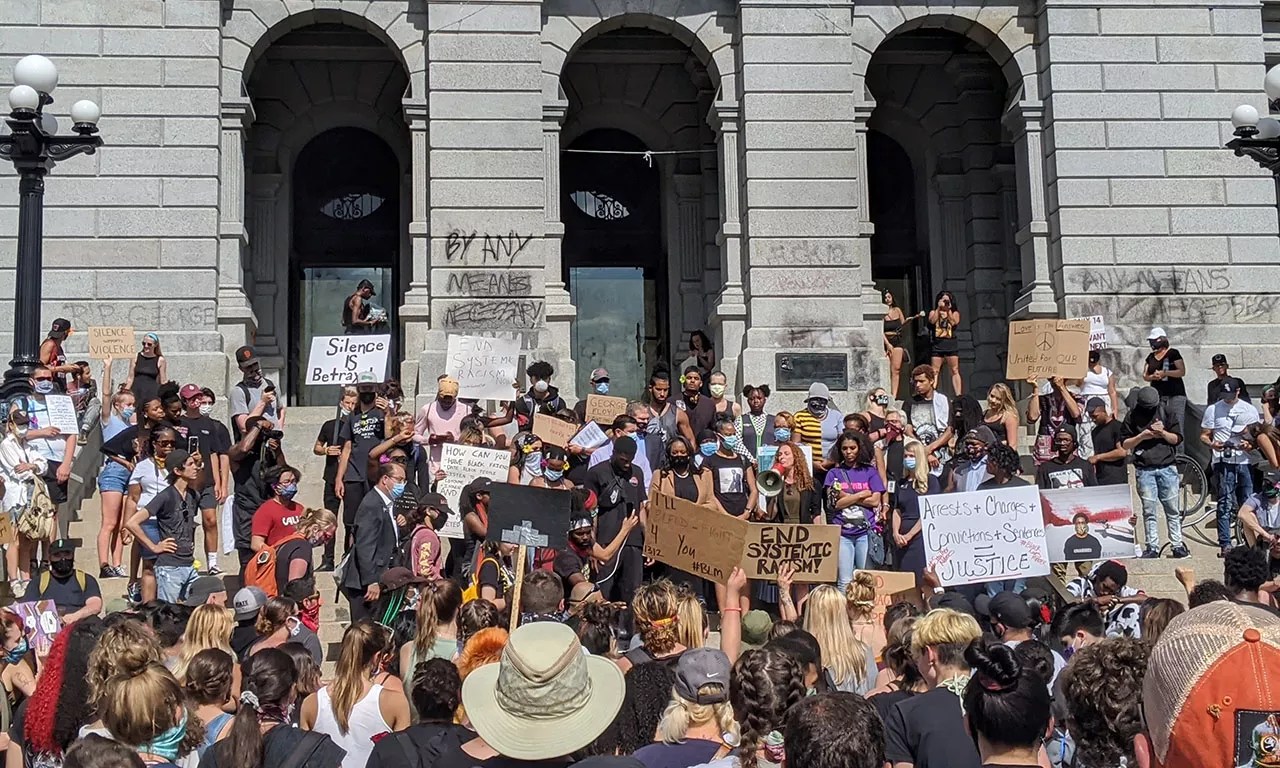
Mari Newman joined the rallies at the Capitol in 2020 to demand an end to racist policing.
Courtesy of Mari Newman
The law overtly draws on the cases that had infuriated Newman throughout her career: It gets rid of bad officers, such as the ones responsible for the deaths of Emily Rice and Marvin Booker, and prevents them from being hired in other departments. To combat the lack of officer accountability, it mandates body-worn cameras, creates penalties for deactivation and tampering (as Newman contends happened when officers restrained Elijah McClain), and requires timely public disclosure of video. It reins in officers’ use of deadly force by prohibiting its use against a fleeing suspect like De’Von Bailey, and fundamentally shifts Colorado law enforcement’s policies to start from the premise that force must be avoided unless absolutely necessary – rather than assuming that force will be used, and that it’s just a question of what kind.
The law also made it easier to hold police officers criminally accountable for using excessive force, which ultimately helped enable the prosecution of those responsible for killing Elijah McClain. It requires officers, such as those who stood by during the attacks on Marvin Booker and Michael Marshall, to intervene. In order to combat the implicit – or explicit – racial bias that is so often the basis of police contacts, it targets racial profiling and requires public reporting of officer interactions. It enables the state attorney general’s office to investigate and sue problem departments, a power that has already been used to impose a consent decree on the Aurora Police Department and, Newman hopes, others in the future. And perhaps most notably, it allows justice for victims of police violence by ending qualified immunity, a legal doctrine that has been used by abusive members of law enforcement as a “get out of Jail free card.”
The Fight for Civil Rights
The laws enhancing police accountability and codifying LGBTQ equality were not Newman’s only legislative efforts to fix the systems that allow civil rights violations. In 2018, the world stared aghast at the video of Diana Sanchez giving birth alone in a Denver County Jail cell. With her permission, Newman released footage of her client’s ordeal in order to force Denver officials to take responsibility.
In 2020, Newman won a half-million-dollar settlement for Sanchez from the Denver Sheriff Department and Denver Health, but she was not satisfied that this would inspire the changes that were necessary to prevent such a situation from happening again. After all, this was not the first time that Newman had represented a pregnant person in labor who was denied medical care while incarcerated. Very early in her career, she’d represented Pamela Clifton after a prison guard refused to call the doctor when Clifton was in labor, telling her instead to go back to her unit because there were plenty of women there “who knew how to birth babies.” Over time, Clifton stopped feeling fetal movement: Her baby had been strangled by its umbilical cord.
“I experienced the same complications in my childbirth, but my daughter survived because there was no prison guard who could arbitrarily deny my access to medical care,” Newman says. “It has been said that the measure of a society is how it treats its weakest members; our treatment of people in the criminal justice system surely does not reflect well on us.”
Clifton, who’s now with the Colorado Criminal Justice Reform Coalition, invited Newman to work with her on a bill urging courts to offer bonds or other sentences besides jail time for pregnant people. “Since her release, Pam has dedicated herself to helping others in the system. She is not just a friend, but one of my true heroes,” Newman says. The bill was passed by the Colorado Legislature and went into effect in August 2023 with the help of testimony from Newman herself, who says that if the bill had become law earlier, Sanchez and her baby might have been spared the gruesome experience they’d had to endure.
Over the past few years, Newman has seen a major shift as previously unpopular causes found acceptance in the mainstream. “Police brutality against people of color is nothing new, but the televised video of George Floyd’s murder while we were home in front of our televisions during the pandemic caused a significant shift. White Americans could no longer deny what was happening,” says Newman. “We’ve also made remarkable strides in societal acceptance of LGBTQ rights. When I began advocating in the late 1990s for a bill that included equal treatment of transgender people, many of Colorado’s elected officials seemed to have no idea what I was talking about. The state has now elected an openly transgender woman. Hate crimes and discrimination persist, but we have certainly made progress.”
Newman’s decades of work to stop police brutality and other government and corporate abuse was recognized in 2022, when she was named Lawyer of the Year by Best Lawyers in America for her work in civil rights. Ten years earlier, she had been told that her work on behalf of Guantanamo detainees would effectively limit her career. Defying the odds, she instead went on to win hundreds of cases and has now started a new firm, Newman | McNulty, which she describes as “a civil rights and employment law firm rooted in client-centered advocacy, movement lawyering, pro bono service, and representation of marginalized communities.”
Know Your Enemies
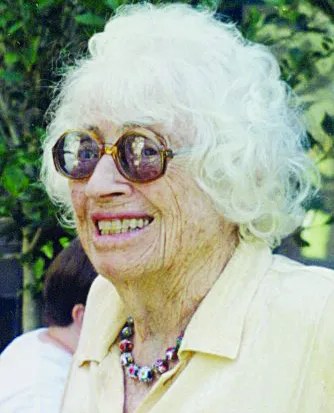
Gertrude Hausmann
Courtesy of Mari Newman
But as Newman’s grandmother had warned, her vocal opposition to the abuse of power by the government and corporations has earned her some enemies, too. Newman has received more than her share of threats – including at least one that was hand-delivered to her home. Because she didn’t want her family to be frightened, she didn’t show it to them.
And some of Newman’s adversaries have attempted to take her down publicly. After she made statements to the media about worker exploitation by a salon chain, the owner tried to silence Newman by threatening to sue her. She did not back down, even after the salon owner brought a lawsuit against her as part of a larger effort to disqualify her from serving as counsel for the entire class of impacted workers in federal court. But the tactic backfired, and the salon’s owner didn’t just fail in his effort to get her off the federal court case; he lost the case against Newman and her co-counsel and ended up having to pay hundreds of thousands of dollars in attorneys’ fees.
A few years ago, Newman took on Shotgun Willie’s in Glendale, while also representing exotic dancers at other venues, suing the clubs for not paying strippers and requiring them to work only for what was left of their tips after paying mandatory fees to the clubs and sharing their tips with bouncers and DJs. In retaliation, Shotgun Willie’s didn’t just cooperate on a hit piece against her in a local paper, but also put up a picture on a wall showing a penis ejaculating in Newman’s face. It was a perfect chance to stand up against a bully and to turn the tables on Shotgun Willie’s. Newman filed claims against the club for trying to interfere with the attorney-client relationship between Newman and the dancers, and showed the judge the picture in federal court. It was worth at least a thousand words. She won the case.
That’s not exactly what her grandmother had in mind, but Newman has embraced her role as an outspoken disruptor of oppressive systems…all oppressive systems. “I guess I must be doing something right,” she says, “or they wouldn’t be trying so hard to silence me.”